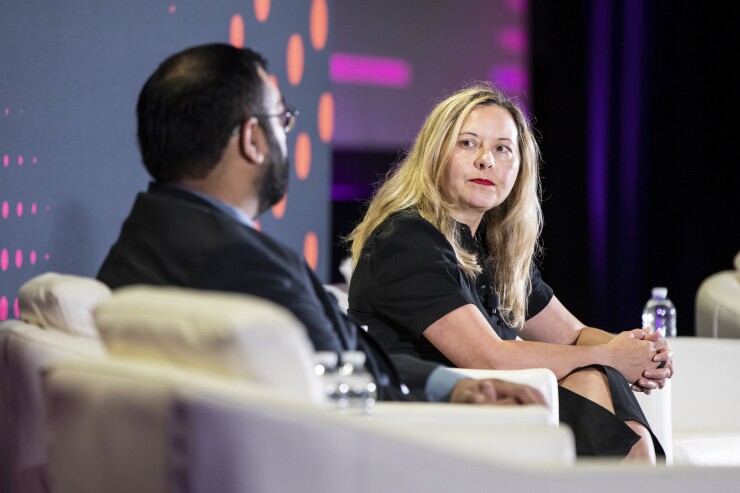
WASHINGTON —
Most Republicans, so far, are taking a wait-and-see approach with her nomination, according to interviews with and statements from Senate Banking Republicans. They will have the first formal opportunity to question Goldsmith Romero when she comes before the Senate Banking Committee for a confirmation hearing, which has not yet been scheduled.
"I am still reviewing the qualifications of Christy Goldsmith Romero and look forward to meeting with her in the coming weeks ahead of her confirmation hearings," said Sen. Cynthia Lummis, R-Wyo.
Sens. Katie Britt, R-Ala., and Steve Daines, R-Mont., shared similar sentiments. Senate Banking Committee ranking member Sen. Tim Scott, R-S.C., said his statement from the day the White House announced their intent to nominate Goldsmith Romero remains unchanged.
"I will review Christy Goldsmith Romero's nomination to ensure she has the qualities necessary to support employees, lead the FDIC through the changes it desperately needs, and return credibility to the independent agency," Scott said in his statement last week.
Goldsmith Romero's confirmation would usher in a new age at the FDIC. She'd be the first Democratic policymaker to lead the agency other than
After an era at the agency that's been defined by a limited set of voices for more than two decades, the shift to Goldsmith Romero comes with a lot of unknowns about policy and enforcement, especially given her relative lack of experience in the banking regulatory world.
As the chair of the agency, Goldsmith Romero would have control over the FDIC board's agenda, and she would control how aggressively the agency pursues certain rulemakings and policy, such as finalizing or restarting the Basel III endgame proposal.
"If you had to worry about anything, you'd worry that she doesn't have the bank supervisory experience, and she's going to run a bank supervisor," said David Zaring, a bank law professor at Wharton. "It's not supposed to be a closed college or cathedral in financial regulation, but it looks to me like she's never worked with the [Office of the Comptroller of the Currency], the FDIC or the Federal Reserve before."
While Goldsmith Romero worked as the special inspector general of the Troubled Asset Relief Program in the aftermath of the 2008 financial crisis, Zaring said this was an oversight position — not a policymaking one.
"She's certainly interacted with banks in her role as one of the enforcers at SIGTARP, but she's never supervised banks," Zaring said.
This gives little for Republicans to complain about, but also little to inspire them to reach across the aisle and fast-track Goldsmith Romero's confirmation. According to three sources familiar with senior banking Republicans' thinking, lawmakers' staffs are reviewing Goldsmith Romero's record on cryptocurrency, in particular.
"Stopping her would mean making a big deal of something, like her lack of bank regulatory experience," said Ian Katz, managing director of Capital Alpha Partners. "I think that will certainly be a subject of discussion, but so far it seems like they won't try all-out to stop her."
Republican banking staff are also looking over Goldsmith Romero's congressional testimony from her time at SIGTARP. At the time, she suggested that bank regulators should be more aggressive in finalizing Dodd-Frank rulemakings and in guarding against risk.
"Treasury and regulators should set strong capital requirements and liquidity cushions to absorb shock; longer-term funding to prevent a liquidity crisis; strong rules regarding leverage; and constraints on specific products or lines of business that hide true exposure to risk," Goldsmith Romero said in 2013. "In the wake of the 2008 financial crisis, we realized that change was necessary. There has been meaningful change to our financial system. But there is much more to be done."
The risk to Goldsmith Romero's confirmation, Katz said, is that lawmakers down the middle of the political spectrum such as Sens. Krysten Sinema , I-Ariz., Joe Manchin, I-W.V. or Jon Tester, D-Mont., express some doubt about her qualifications. Republicans could seize on that and try to delay a confirmation vote until after the 2024 election.
Lawmakers that voted to roll back some Dodd-Frank rules in Sen. Mike Crapo's 2018 regulatory tailoring bill — including Tester and Sen. Mark Warner, D-Va. — may hold the key as to whether Goldsmith Romero has a clear path to confirmation, which logistically will have to happen before August if it happens at all.
"If it's not done by then, it gets tough," Katz said.






